Related Research Articles

Joseph Chamberlain was a British statesman who was first a radical Liberal, then a Liberal Unionist after opposing home rule for Ireland, and eventually served as a leading imperialist in coalition with the Conservatives. He split both major British parties in the course of his career. He was the father, by different marriages, of Nobel Peace Prize winner Austen Chamberlain and of Prime Minister Neville Chamberlain.
The Liberal Unionist Party was a British political party that was formed in 1886 by a faction that broke away from the Liberal Party. Led by Lord Hartington and Joseph Chamberlain, the party established a political alliance with the Conservative Party in opposition to Irish Home Rule. The two parties formed the ten-year-long coalition Unionist Government 1895–1905 but kept separate political funds and their own party organisations until a complete merger between the Liberal Unionist and the Conservative parties was agreed to in May 1912.
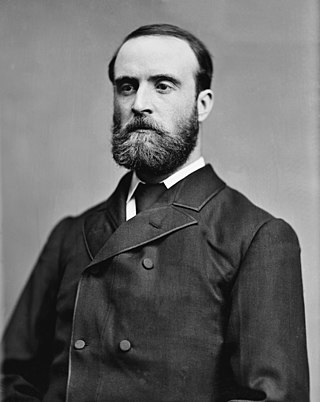
Charles Stewart Parnell was an Irish nationalist politician who served as a Member of Parliament (MP) from 1875 to 1891, also acting as Leader of the Home Rule League from 1880 to 1882 and then Leader of the Irish Parliamentary Party from 1882 to 1891. His party held the balance of power in the House of Commons during the Home Rule debates of 1885–1886.
Home rule is government of a colony, dependent country, or region by its own citizens. It is thus the power of a part of a state or an external dependent country to exercise such of the state's powers of governance within its own administrative area that have been decentralized to it by the central government.
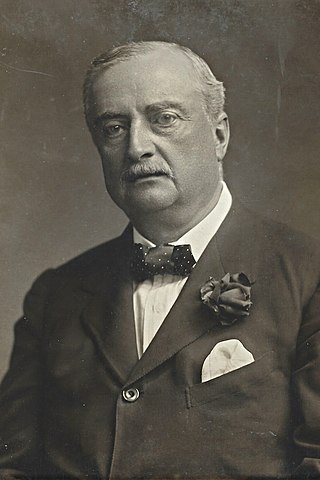
John Edward Redmond was an Irish nationalist politician, barrister, and MP in the House of Commons of the United Kingdom. He was best known as leader of the moderate Irish Parliamentary Party (IPP) from 1900 until his death in 1918. He was also leader of the paramilitary organisation the Irish National Volunteers (INV).
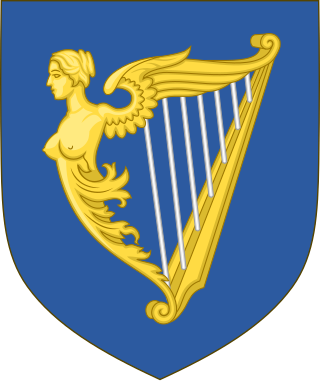
The Irish Parliamentary Party was formed in 1874 by Isaac Butt, the leader of the Nationalist Party, replacing the Home Rule League, as official parliamentary party for Irish nationalist Members of Parliament (MPs) elected to the House of Commons at Westminster within the United Kingdom of Great Britain and Ireland up until 1918. Its central objectives were legislative independence for Ireland and land reform. Its constitutional movement was instrumental in laying the groundwork for Irish self-government through three Irish Home Rule bills.

The 1886 United Kingdom general election took place from 1 to 27 July 1886, following the defeat of the Government of Ireland Bill 1886. It resulted in a major reversal of the results of the 1885 election as the Conservatives, led by Lord Salisbury, were joined in an electoral pact with the breakaway Unionist wing of the Liberals led by Lord Hartington and Joseph Chamberlain. The new Liberal Unionist party elected 77 members and gave the Conservatives their parliamentary majority, but did not join them in a formal coalition.

The Local Government (Ireland) Act 1898 was an Act of the Parliament of the United Kingdom of Great Britain and Ireland that established a system of local government in Ireland similar to that already created for England, Wales and Scotland by legislation in 1888 and 1889. The Act effectively ended landlord control of local government in Ireland.

The Home Rule League (1873–1882), sometimes called the Home Rule Party, was an Irish political party which campaigned for home rule for Ireland within the United Kingdom of Great Britain and Ireland, until it was replaced by the Irish Parliamentary Party. The Home Rule Confederation of Great Britain was a sister organisation in Great Britain.

The Government of Ireland Bill 1886, commonly known as the First Home Rule Bill, was the first major attempt made by a British government to enact a law creating home rule for part of the United Kingdom of Great Britain and Ireland. It was introduced on 8 April 1886 by Liberal Prime Minister William Gladstone to create a devolved assembly for Ireland which would govern Ireland in specified areas. The Irish Parliamentary Party under Charles Stewart Parnell had been campaigning for home rule for Ireland since the 1870s.
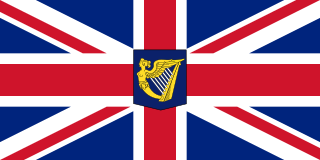
Ireland was part of the United Kingdom from 1801 to 1922. For almost all of this period, the island was governed by the UK Parliament in London through its Dublin Castle administration in Ireland. Ireland underwent considerable difficulties in the 19th century, especially the Great Famine of the 1840s which started a population decline that continued for almost a century. The late 19th and early 20th centuries saw a vigorous campaign for Irish Home Rule. While legislation enabling Irish Home Rule was eventually passed, militant and armed opposition from Irish unionists, particularly in Ulster, opposed it. Proclamation was shelved for the duration following the outbreak of World War I. By 1918, however, moderate Irish nationalism had been eclipsed by militant republican separatism. In 1919, war broke out between republican separatists and British Government forces. Subsequent negotiations between Sinn Féin, the major Irish party, and the UK government led to the signing of the Anglo-Irish Treaty, which resulted in five-sixths of the island seceding from the United Kingdom, becoming the Irish Free State, with only the six northeastern counties remaining within the United Kingdom.
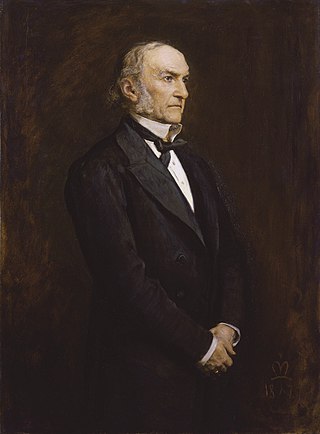
Gladstonian liberalism is a political doctrine named after the British Victorian Prime Minister and leader of the Liberal Party, William Ewart Gladstone. Gladstonian liberalism consisted of limited government expenditure and low taxation whilst making sure government had balanced budgets and the classical liberal stress on self-help and freedom of choice. Gladstonian liberalism also emphasised free trade, little government intervention in the economy and equality of opportunity through institutional reform. It is referred to as laissez-faire or classical liberalism in the United Kingdom and is often compared to Thatcherism.
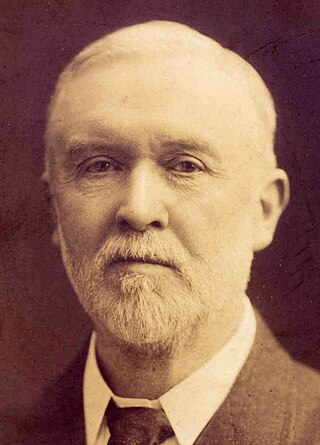
John Joseph Clancy, usually known as J. J. Clancy, was an Irish nationalist politician and Member of Parliament (MP) in the House of Commons for North Dublin from 1885 to 1918. He was one of the leaders of the later Irish Home Rule movement and promoter of the Housing of the Working Classes (Ireland) Act 1908, known as the Clancy Act. Called to the Irish Bar in 1887, he became a King's Counsel in 1906.
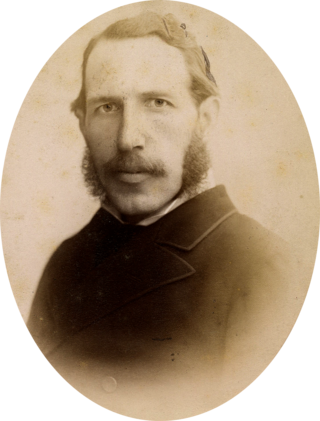
John O'Connor Power was an Irish Fenian and a Home Rule League and Irish Parliamentary Party politician and as MP in the House of Commons of the United Kingdom of Great Britain and Ireland represented Mayo from June 1874 to 1885. From 1881, he practised as a barrister specialising in criminal law and campaigning for penal reform.
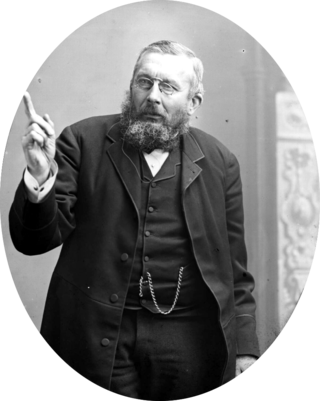
Joseph Gillis Biggar, commonly known as Joe Biggar or J. G. Biggar, was an Irish nationalist politician from Belfast. He served as an MP in the House of Commons of the United Kingdom of Great Britain and Ireland as member of the Home Rule League and later Irish Parliamentary Party for Cavan from 1874 to 1885 and West Cavan from 1885 to his death in 1890.
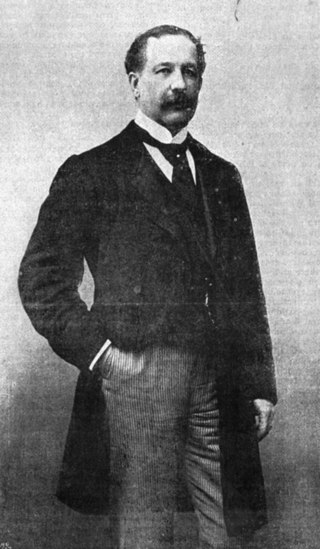
Captain William Henry O'Shea was an Irish soldier and Member of Parliament. He is best known for being the ex-husband of Katharine O'Shea, the long-time mistress of the Irish nationalist leader Charles Stewart Parnell.
The term New Departure has been used to describe several initiatives in the late 19th century by which Irish republicans, who were committed to independence from Britain by physical force, attempted to find a common ground for co-operation with groups committed to Irish Home Rule by constitutional means. In the wake of the Fenian Rising of 1867 and the unpopular executions which followed it, Fenianism was popularised and became more moderate, while the Home Rule movement was edging toward radicalism at the same time, laying the framework for the alliance. The term was coined by John Devoy in an anonymous article in the New York Herald on 27 October 1878 in which he laid out a framework for a new policy.
The Hawarden Kite was a famous British newspaper scoop of December 1885, that Liberal Party leader William Gladstone now supported home rule for Ireland. It was an instance of "kite-flying", made by Herbert Gladstone, son of the Leader of the Opposition William Ewart Gladstone, who often served as his father's secretary. It was given to Edmund Rogers of the National Press Agency in London. The statement was accurate but it is unknown whether the father knew and approved of releasing it to the press. The bombshell announcement resulted in the fall of Lord Salisbury's Conservative government. Irish Nationalists, led by Charles Parnell's Irish Parliamentary Party, held the balance of power in Parliament. Gladstone's conversion to Home Rule convinced them to switch away from the Conservatives and support the Liberals using the 86 seats in Parliament they controlled.
Garrett Michael Byrne was an Irish nationalist and MP in the House of Commons of the United Kingdom of Great Britain and Ireland and as member of the Irish Parliamentary Party represented Co. Wexford, 1880–83, and West Wicklow, 1885–92. He was a strong supporter of Charles Stewart Parnell.

The Home Rule movement was a movement that campaigned for self-government for Ireland within the United Kingdom of Great Britain and Ireland. It was the dominant political movement of Irish nationalism from 1870 to the end of World War I.
References
- ↑ Connolly, S. J., ed. (2002). The Oxford Companion to Irish History (2 ed.). Oxford University Press. ISBN 9780199234837.
- ↑ Jaconelli, Joseph (1990). "Human Rights Guarantees And Irish Home Rule". Irish Jurist. 25/27: 181–193. JSTOR 44026799.
- 1 2 Jackson, Alvin (2003). Home Rule: An Irish History, 1800-2000. Oxford University Press. p. 54. ISBN 9780195220483.
- ↑ Howard, C. H. D. (September 1953). "Joseph Chamberlain, Parnell and the Irish 'Central Board' Scheme, 1884-5". Irish Historical Studies. Cambridge University Press. 8 (32): 324–361. doi:10.1017/S002112140002753X. JSTOR 30006195. S2CID 159673246.
- ↑ Lyons, F.S.L. (2005). Charles Stewart Parnell. Gill & Macmillan. ISBN 9780717139392.